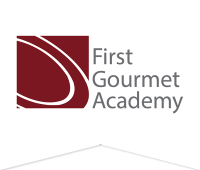International Diploma in Professional Culinary Arts
The objective of the International Diploma in Professional Culinary Arts is to enhance, increase and strengthen students’ knowledge and skills in Culinary Arts. They will learn about the Basic Skills and Techniques required in a professional kitchen. The student is also expected to acquire experiences and learnings in International Cuisines with emphasis on Western and Eastern Cuisines to be taught by world class instructors will teach them a handful of detectable intercontinental recipes. This program will run for ten (10) months.
Here are the modules covered by the program.
Module 1: Food Safety
6 Sessions
The course starts with a lecture stressing the importance of sanitation, characteristics and causes of food borne illness, and preventing unsanitary conditions. Aside from this, students are also trained by the FDM Training Center-Forward Learning, the authorized International Training Center of the American Heart Association and accredited by the Professional Regulation Commission in the Philippines. This activity provides them with invaluable life skills in order to prepare them during emergency situations. Participants will receive a First Aid Certification after the training.
Module 2: Basic Culinary Skills
18 Sessions
Knife handling is one of the most basic building blocks in culinary arts. Whether it’s the students first time in the kitchen or not, the 16-session module will help them sharpen their basic skills with greater consistency and confidence. Class begins with a tutorial on proper posture and knife handling. Kitchen terminology will become their second language. After a series of slicing and dicing, students then will sharpen their skills in deboning chicken, beef, and pork as well as filleting fish. They are trained to create great soups with its basic stocks even without using recipes.
Module 3: Food Science
19 Sessions
This module presents a more advanced technique in food preparation. Topics covered include breakfast foods, rice, beans, potatoes, and the basic cooking techniques such as blanching, braising sautéing, etc. Mastery of cooking technique is an essential yet a difficult aspect of the culinary craft. These dry heat, moist heat, and combination heat cooking methods are taught carefully as students produce great treasures in the kitchen.
Module 4: Garde Manger
9 Sessions
Students get to be creative at this module as they prepare their hot and cold hors d’oeuvres. They will learn how to make their own sausages, pâtés, rillettes, ham, and confit. With various methods on curing, salting, and smoking, working with seasonings and casings will be explored. At the end of the course, students get to share their sumptuous spread of mouthwatering dishes to their families and friends as they prepare a buffet for the guests.
Module 5: Wellness Cooking
6 Sessions
Being healthy is more than being physically fit. This course offers a comprehensive review of food, nutrients and nutrition. Major nutrient classes (such as carbohydrates, fats, protein, vitamins and minerals) and the relationship of food and nutrients to areas of current interest (including diets and weight control) will be discussed. Students will also practice cooking and serving food simultaneously.
Module 6: Eastern Cuisines
13 Sessions
The collection of Asian flavors has a large influence on all types of food. Students will explore new ingredients from different Asian regions and learn their proper application. Asia’s favorite dishes will be thoroughly explained and cooked so students can easily take their new knowledge to their own kitchen and continue their culinary journey throughout Asia.
Module 7: Western Cuisines
11 Sessions
Regional food is central to an exciting cuisine. In this course, students will learn the basic skills and knowledge of Western culinary arts through theory, practical workshops and immersion in the rich and diverse heritage of classical cuisines from France, Italy, Spain and Greece just to name a few.
Module 8: American Cuisines
5 Sessions
Cuisines covered in this module reflects foods commonly identified with culinary regions throughout North as well as South America. Students will prepare various American Cuisines, which employ basic culinary principles, concepts and quality standards. In this module, students will also learn about wine appreciation wherein they will improve their wine tasting skills.
Module 9: Externship
600 Hours
At the end of their in-class training, all students are assigned an externship. The program will help them with their careers in the future. This is to give students a short actual experience in the kitchen. An application is usually required in hotels and restaurants where students are interviewed by the institution. This can also help students learn more about effective techniques for achieving employment. With the required 600 hours of training, it is a chance for them to observe, ask questions and gain hands on learning within the hotel or restaurant in order to meet their professional goals.
Module 10: TESDA Assessment, Final Exam
6 Sessions
Students are tested on what they learned in the whole course with a comprehensive final exam in the lecture room and in the kitchen.


